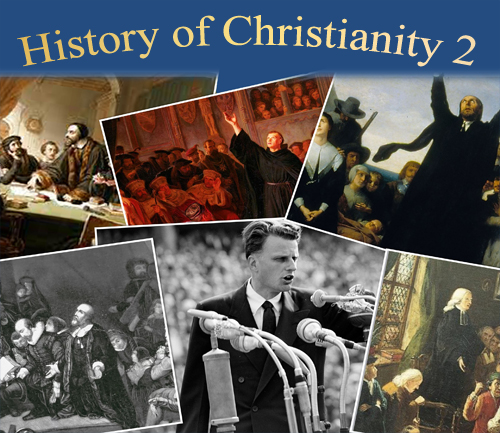Module 16: Current & Future Church
Hi everyone, and welcome back to the sixteenth and final module of the History of Christianity 2 Course. In this section, we'll review many of the lessons learned from the history of Christianity covered in this course and work through how we can put those lessons into practice in the current church and work toward a better future.
This module will help you to understand both the challenges and opportunities of the current church, based on all the historical forces that have brought us to this point in history. The student will be invited to evaluate the various challenges and prepare themselves to beware and avoid the dangers these challenges pose to faithfulness and success. And the student will also be invited to recognize the many opportunities to exercise wisdom and faithfulness in being a part of what God is doing in their own current situation. And the student will be invited to wisely evaluate and plan the possible futures based on current trends, as well as their own response to the challenges and opportunities of their own circumstances. The student will have opportunity to evaluate the projected outcomes based on the lessons and trends they have learned from history. This module will also aid the student to work through personal goals and action steps, based on the principles learned, and how these should be applied in their own life and ministry.
Introductory Scenario
Imagine that the internet and all libraries had just been destroyed and all historical information had been lost forever. Because you have completed this course, you have been asked to preserve and teach the lessons from history that had been lost. What are the most important lessons learned and how should they be applied? What lessons are most important in general for all humanity? What lessons are most important for the church and Christians in general? What lessons are most urgent for your own local church? What lessons are most important for you personally? Why are these lessons the most pressing and necessary? What should we do in response to these lessons learned? How should these lessons be applied in each of these contexts? Please consider these questions and be watching for material that will help you answer them as you work through this module.
Module Objectives and Outcomes
Upon successful completion of this module, the student will:
- Review and reflect on the history covered in this course and the principles and lessons learned from that history.
- Understand the current state of the worldwide church in light of a thoughtful review of the history that has brought the church to this point.
- Describe the current challenges that the church faces, both from inside the church, and from the surrounding culture, and the dangers that must be avoided from these challenges.
- Describe the current opportunities of the church in the present and immediate future and the strategies the church should use to meet those opportunities.
- Evaluate their own situation and formulate attitudes, goals, strategies, and action steps to best and most faithfully serve God and His purposes in their own situation.
- Review the history of Christianity and place the overall movements in a general chronology.
Instruction Guides
In this section, you'll find links to important instructional documents for this module. Click the following links to open each document. There is a set of instructions for individual study and a document for group study.
Supplemental Reading
The student will read the assigned secondary reading linked below. Think through the content of this articles and use the insights gained as part of your course material response and application reflection or discussion.
Lecture Content
In this section, you will find the video lectures for the Great Awakenings module. They are designed to be watched in order, but each video should make sense on its own. Click each banner to open access to each video. There are also links with each video if you prefer to watch on the Rumble or YouTube interface or download just the audio to listen offline.




















